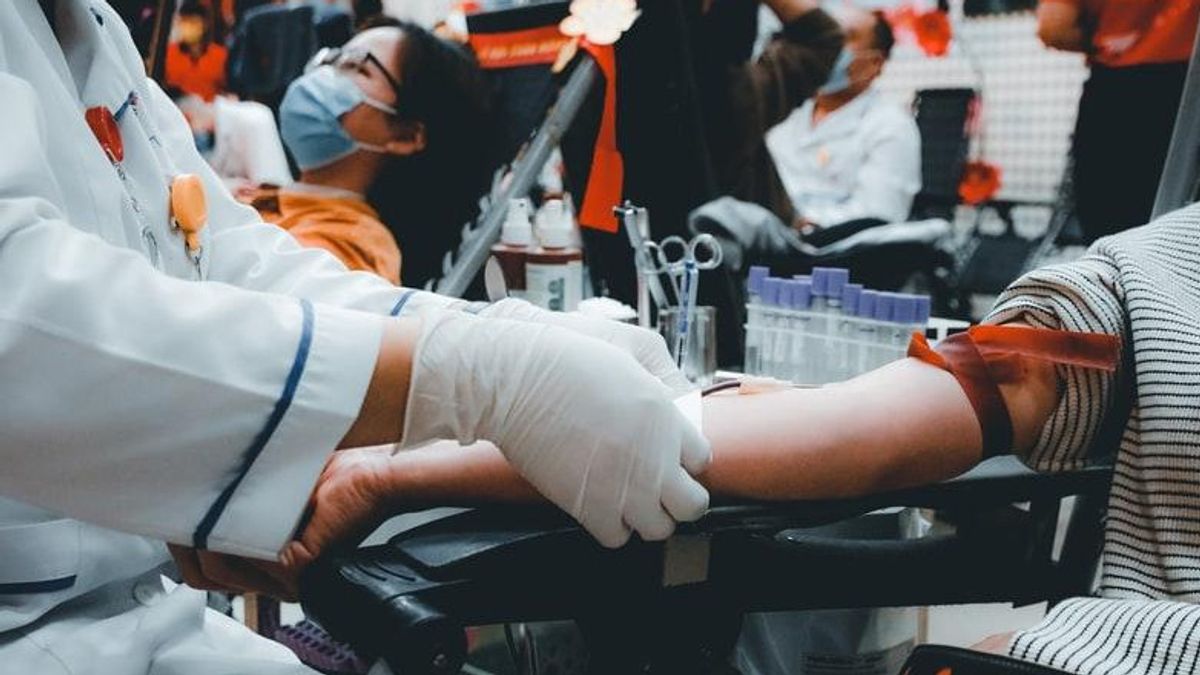JAKARTA - We have just celebrated World Blood Donor Day on June 14. The warning was initiated by the World Health Organization (WHO) to spread awareness about the importance of blood donation. But what are the requirements for blood donation?
Everyone who wants to donate blood must meet several conditions. In fact, not everyone can donate blood.
In addition to avoiding excessive physical activity and adequate rest. Blood donors have the following requirements:
- Physically and mentally healthy
- Age 17 to 65 years.
- Minimum weight 45 kg.
- Systolic blood pressure 100 - 170 and diastolic 70 - 100
- Hemoglobin level 12.5g% to 17.0g%
- Donor interval at least 12 weeks or 3 months since the previous blood donor (maximum 5 times in 2 years)
If interested, potential donors can take and sign the registration form, then undergo a preliminary examination, such as weight, HB, and blood type, before proceeding with a doctor's examination.
These requirements must be owned by blood donors. What should be avoided is if the blood donor has:
- Have heart and lung disease
- Suffering from cancer
- Suffering from high blood pressure (hypertension)
- Suffering from diabetes (diabetes mellitus)
- Tend to abnormal bleeding or other blood disorders.
- Suffering from epilepsy and frequent seizures
- Have or have had Hepatitis B or C.
- Have syphilis
- Drug Addiction.
- Alcoholic Beverage Addiction
- Have or are at high risk of HIV/AIDS
- Doctors advise against donating blood for health reasons.
Prohibition on blood donation

Donors must also be free from alcohol, hepatitis, diabetes mellitus, and epilepsy. In addition, donors should not be those who are part of a high-risk community group to get AIDS and experience illness, such as fever or influenza.
People who have had their teeth removed in less than three days are also prohibited from donating blood. Even with those who have received a transfusion for less than a year, those who have not had a year of tattooing, piercing, or acupuncture.
Pregnant and lactating mothers are also temporarily unable to become donors. However, some donor guidelines are quoted from PMI as follows:
- Sleep at least 4 hours before donation.
- Eat 3-4 hours before donating blood. do not donate blood on an empty stomach.
- Drink more than usual on the day of donating blood (at least 3 glasses)
- After the donor rests for at least 10 minutes while enjoying the donor's food, before returning to activities.
- Returning to work after blood donation is not harmful to health.
- To avoid swelling at the needle site, avoid lifting heavy objects for 12 hours.
- Drink a lot for the next 72 hours to restore stamina.
Access PMI's mobile blood donation service
PMI can also be called to your area with a minimum requirement of 50 potential donors. In addition, PMI public car calls must have the following conditions:
- Provide a room that is by the number of donors, clean, well ventilated, and shady (not in the sun) with clean water facilities and a parking lot for unit car buses.
- Provide a minimum of 4 tables and several chairs according to the number of donors.
Benefits of blood donation
In addition to blood recipients, blood donors are also beneficial for donors. According to dr. Robert DeSimone, chief of transfusion medicine at New York-Presbyterian/Weill Cornell Medical Center, said that regular blood donation is associated with reduced blood pressure and the risk of a heart attack.
"It definitely helps reduce cardiovascular risk factors", says Dr. DeSimone, citing Healthy Matters, Thursday, June 17.
What is the relation? "If your hemoglobin is too high, donating blood helps lower blood viscosity, which has been linked to blood clot formation, heart attacks, and strokes", said Dr. DeSimone.
“Interestingly, this benefit was more significant in men than women. We think maybe it's because women have menstrual cycles, so they do it naturally without donating blood".
In addition, people donate blood because they feel happy to be able to help others. Altruism and volunteerism have been associated with positive health outcomes, including a lower risk of depression and longer life.
“Donating blood is a way to get involved in an immediate community and help those around you”, said Dr. Sarah Vossoughi, medical director of apheresis and assistant director of transfusion medicine at New York-Presbyterian/Columbia University Irving Medical Center.
"People who do these kinds of things and engage in their communities in this way tend to have better health and longer lives".

In addition, by regularly donating blood a person can maintain a healthy liver. The amount of iron that is too much affects the non-alcoholic fatty liver.
As explained in the MEMORY article entitled WHO Ingin Kita Donor Darah Mengikuti Ilmuwan Jerman Karl Landsteiner, by donating blood, the amount of iron is reduced in the body. That is, non-alcoholic fatty liver can be prevented so that liver health is maintained.
World Blood Donor Day also recognizes the contribution of voluntary unpaid blood donations to save many lives. Today is also a thank you to everyone who regularly donates blood.
According to WHO, many developing countries face severe blood shortages. "The need for blood is universal, but access to blood for all who need it is not", he added.
Regular, voluntary and unpaid blood donation is an act of solidarity and is needed worldwide. World Blood Donor Day is a very important day of awareness.
Countries around the world are taking part in this campaign to emphasize the importance of safe blood donation and why healthy people should actually donate blood. Usually, blood donors are held in schools, institutions, and workplaces.
*Read other information about HEALTH or read other interesting articles from Putri Ainur Islam.
Other BERNAS
SEE ALSO:
The English, Chinese, Japanese, Arabic, and French versions are automatically generated by the AI. So there may still be inaccuracies in translating, please always see Indonesian as our main language. (system supported by DigitalSiber.id)









